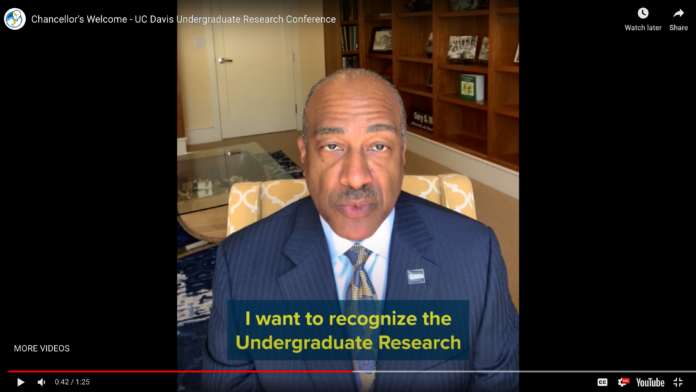Undergraduate Research Scholarship and Creative Activities Conference held online
The Undergraduate Research Center (URC) held the 31st annual Undergraduate Research Scholarship and Creative Activities Conference from May 7–8, albeit in a new way: It was entirely online.
Every year, the conference gives undergraduate students in all academic fields the chance to get acquainted with the process and the academic rigors of presenting research in a scholarly manner.
This year, over 600 students presented at a virtual conference hosted through GoReact, an online sharing service that allows for feedback. The conference drew over 1,000 unique attendees. In previous years, the conference is expected to attract 6,000–7,000 attendees and over 800 student presenters. Attendees included faculty, staff, other students, family members and other conference participants.
At the beginning, it wasn’t clear that the conference would be held this year, as the prospect of completely restructuring a university-wide conference left many questions unanswered. The URC quickly sent out a survey to the 800 students originally scheduled to present at the conference to gauge interest for some form of the conference. Organizers found overwhelming support for moving forward with an online platform.
The URC immediately sprung into action, searching for a platform that would support a dialogue between presenters and attendees and allow for the classic experience of presenting at a collegiate research conference. The creation of this atmosphere was incredibly important for the many students hoping to present and graduate this spring.
“I hoped to polish my presentation and public speaking skills as well as develop [the skills] to share a complex topic in a relatively easy to understand visual and graphic format,” said Taryn Lausch, a fourth-year geology major who presented her research regarding deep earthquakes in the Mt. Diablo region at the conference.
This sentiment was echoed by Isaiah Ornelas, a fourth-year biochemistry and molecular biology major and member of the conference organizing committee. Ornelas, who also presented at the Undergraduate Research Conference last year, was surprised by the engagement with his research.
“People who I have previously met before actually commented on my videos so I could reconnect with them for a little bit, thank them for watching my video and just see how they were doing,” Ornelas said.
Pulling off the conference was rewarding for everyone involved, but it wasn’t without challenges.
“Our team was learning the platform at the same time our students were learning the platform,” said E. Nuñez, associate director of the URC. “Obviously, we were under a time crunch. We [transferred everything to GoReact] in a little under a month.”
While having to restructure the entire conference in a month with the added uncertainties related to COVID-19, organizers also had to maintain communication with student presenters.
“Communication was a challenge because, following the theme during this pandemic, there were a lot of unknowns and as we learned information, we needed to gather it and then communicate it out to students,” Nuñez said.
In a time with so much uncertainty, the necessary rush of organizing the conference did not go unnoticed by students.
“Honestly, it kind of stressed me out that it was going to be placed online,” said Brittany Baikie, a third-year neurobiology, physiology and behavior major. “Some of the undergraduates decided to drop out because of overwhelming class schedules and whatnot.”
Nuñez hopes to incorporate the most successful parts of this year’s virtual conference into future in-person conferences.
“One thing that we’re continuing to think about is how can we expand the reach of our conference outside of Davis, outside of Sacramento, outside of even California maybe,” Nuñez said. “And I think when we do that, we include more people that support our students and when we can include more people, that’s always a positive.”
Although the research conference was harder to organize than ever before, it has also never been more relevant, as highlighted in Chancellor Gary May’s Undergraduate Research Conference welcoming statement.
“Our scholarship addresses some of society’s most critical challenges, including climate change, feeding the world, and the sustained the health of all living beings,” May said. “We’re living through extraordinary times, the need for research collaboration and innovation couldn’t be greater.”
Written by: Jessica Baggott — campus@theaggie.org




